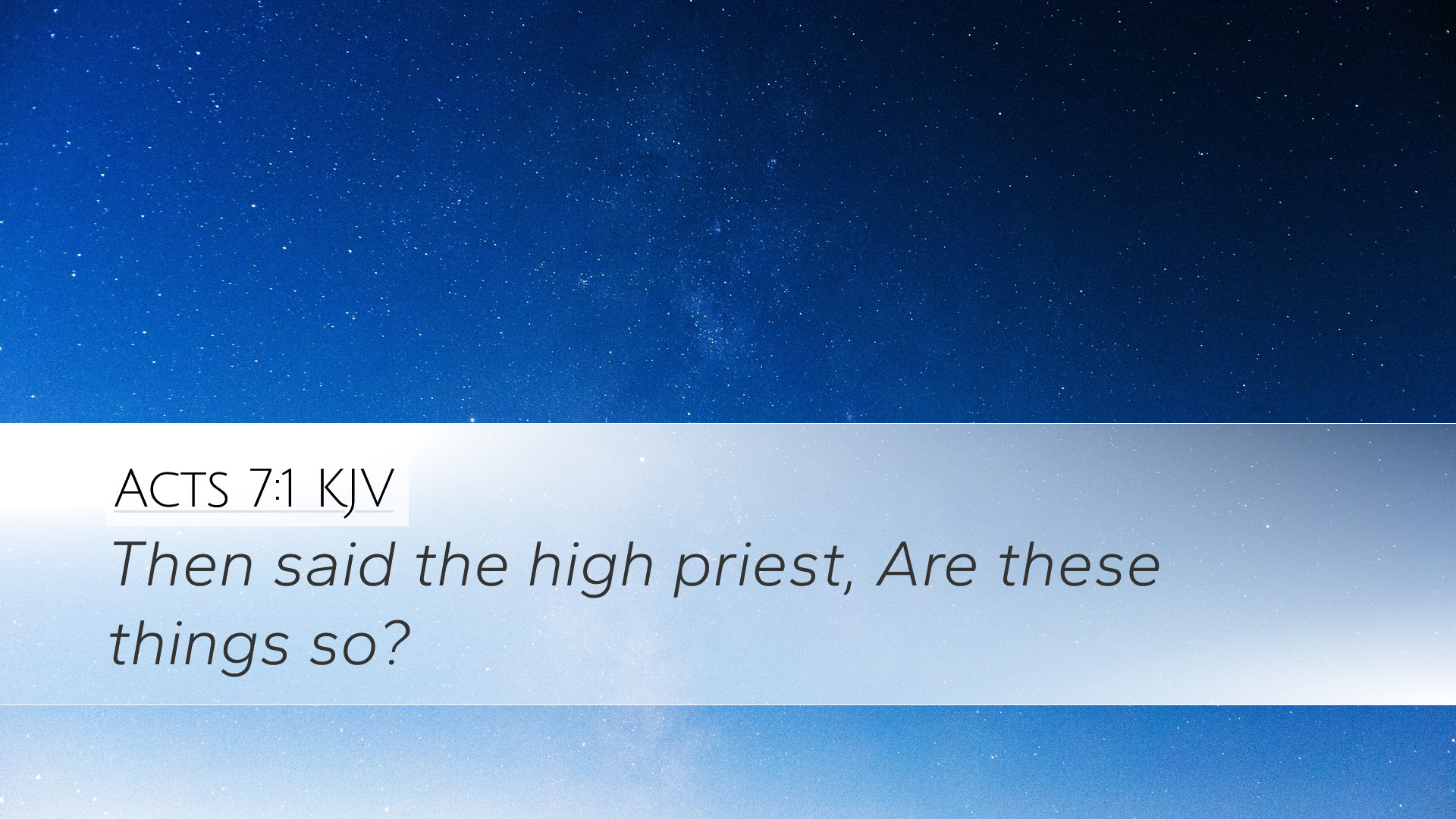Acts 7:1 - Commentary
In Acts 7:1, we find a critical point in the narrative where the high priest poses a question to Stephen: "Are these things so?" This question serves as a pivotal moment that leads to Stephen's powerful defense of the faith. Below, we analyze this verse and its implications through insights from various public domain commentaries, including those of Matthew Henry, Albert Barnes, and Adam Clarke.
Contextual Background
Acts 7:1 occurs during a time of intense opposition against the early Christians. Stephen, one of the seven deacons, had been accused of blasphemy against Moses and God. His response to the questioning priest and the larger Jewish council highlights both his deep understanding of the Hebrew Scriptures and his commitment to the truth of the Gospel.
Matthew Henry's Insights
Matthew Henry emphasizes the significance of the high priest's question as a device to understand Stephen's character and his teachings. Henry notes that:
- Challenge of Authority: Stephen is being challenged about the doctrines he proclaimed, demonstrating the ongoing conflict between the early Church's teachings and the established Jewish authorities.
- God's Sovereignty: Henry points out that Stephen’s ensuing speech (Acts 7:2-53) reveals God's overarching plan in history and emphasizes the faithfulness of God, even in the face of human betrayal.
Albert Barnes' Commentary
Albert Barnes focuses on the implications of the high priest's inquiry and the subsequent response. He states that:
- Defense of Faith: The question "Are these things so?" was not merely an inquiry but also an accusation. Stephen is presented with an opportunity to defend his beliefs systematically.
- Historical Context: Barnes outlines that Stephen’s response serves to connect the history of the Jewish people with the message of Christ, thereby showing continuity rather than contradiction between the Old Testament and the New Testament.
Adam Clarke's Analysis
Adam Clarke provides a detailed examination of the social and theological implications of the confrontation depicted in Acts 7:1. Clarke points out:
- Defining Faith and Tradition: Clarke argues that the question posed to Stephen highlights the tension between religious tradition and the radical new teachings of Christianity.
- Focus on Witness: He emphasizes that Stephen’s defense is not just a defense of himself, but a powerful testimony to the truth of the Gospel and a reminder of Israel’s own history of rejecting God’s messengers.
Spiritual Implications
The response of Stephen in Acts 7 is significant not just for its content but for its boldness. The verse and Stephen's ensuing speech serve several critical functions:
- Witness of Faith: Stephen embodies the call for believers to boldly proclaim their faith in the face of opposition.
- Historical Narration: His recounting of Israel's history serves to educate and remind the Jewish council of their own spiritual legacy and failures, calling them to recognize the continued work of God through Christ.
- Providence: The unfolding narrative of redemption is emphasized, showing that events in the life of God's people are governed by divine sovereignty.
Theological Reflections
Acts 7:1 encourages a deeper theological reflection on the relationship between faith and tradition. It illustrates the necessity for believers to understand the Scriptures in their historical and redemptive context:
- Continuity of God’s Plan: The situation emphasizes how Jesus' teachings are not contradictory to the Jewish Scriptures but rather fulfill them, affirming God’s promises throughout history.
- Call to Accountability: Stephen’s defense challenges contemporary believers to be accountable to God, recognizing the historical failures of God’s people and ensuring not to repeat them.
Conclusion
In summary, Acts 7:1 poses a significant question that sets the stage for one of the most profound speeches in Scripture. The unyielding faith of Stephen invites pastors, students, theologians, and biblical scholars to consider the importance of understanding and articulating the Gospel in the face of adversity. By drawing insights from the commentaries of Matthew Henry, Albert Barnes, and Adam Clarke, we gain a richer appreciation for the depth of this encounter and its implications for the faith community today.


